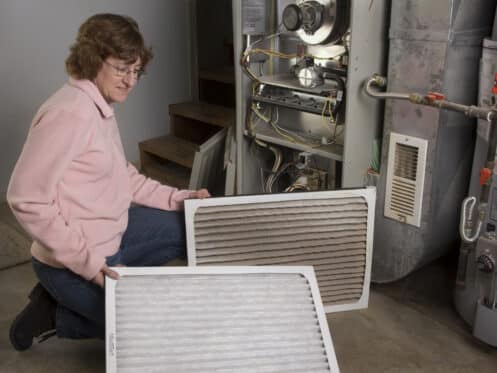Maintaining a comfortable and healthy home environment involves a variety of factors, and one crucial aspect often overlooked is the regular replacement of furnace filters. Your furnace works tirelessly to keep you warm during chilly seasons, and its filters play a vital role in maintaining indoor air quality and the efficiency of the system.
Why Furnace Filters Matter
Indoor Air Quality and Health
Furnace filters serve as the first line of defense against airborne pollutants such as dust, pollen, pet dander, and even bacteria. Regular replacement ensures cleaner air and reduces respiratory issues. This is particularly important for households with children, the elderly, or individuals with preexisting respiratory conditions like asthma.
Extended Equipment Lifespan
A clean filter reduces the strain on your furnace’s blower motor and other components. Proper airflow is critical to preventing overheating and unnecessary wear and tear, ultimately extending the lifespan of your furnace.
Energy Efficiency
A clogged filter forces your furnace to work harder, leading to increased energy consumption and higher utility bills. When the filter is clean, air can flow freely, enabling your furnace to operate efficiently without excessive energy usage.
Preventing System Breakdowns
Neglecting to replace your furnace filter can lead to serious consequences. A clogged filter can cause the furnace to overheat, tripping safety switches and potentially leading to a complete system shutdown. Regular filter replacement helps avoid inconvenient breakdowns during the coldest days of winter.
Improved Comfort
A clean filter ensures consistent airflow throughout your home. When your furnace is operating at peak efficiency, you can enjoy a more comfortable living space with evenly distributed warmth.
Factors Influencing Replacement Frequency
Filter Type
Different filters have varying lifespans. Fiberglass filters typically last around 30 days, while pleated filters can last up to 90 days. High-efficiency filters can last even longer. Choosing the right filter type based on your household’s needs can help you achieve the desired level of air quality and system efficiency.
Household Size
The number of occupants in your home affects the rate at which pollutants are generated. A larger household with more people and potential allergen sources might require more frequent filter replacements to keep up with increased air contamination.
Pet Ownership
If you’re a pet owner, especially with shedding animals, your filters can quickly become clogged with fur and dander. More frequent filter replacements, especially if using lower MERV-rated filters, can help maintain a cleaner indoor environment.
Smoking Indoors
Smoking indoors introduces a host of harmful particles into the air, significantly reducing air quality. If smoking is allowed inside your home, you should consider changing filters more often to mitigate the effects on air quality.
Nearby Construction or Pollution Sources
If your home is situated near a construction site, industrial area, or an area with high levels of pollution, your filters might become dirty faster. In these situations, more frequent replacements are advisable to ensure adequate filtration.
Home Renovations
Renovations can stir up dust and debris, overloading your filters. During and after renovations, it’s a good idea to replace filters more frequently to prevent excessive buildup in the HVAC system.
Respiratory Conditions
If anyone in your household has respiratory conditions like asthma or allergies, consider more frequent filter replacements. Clean filters help reduce airborne allergens and irritants that can trigger symptoms.
Location
Climate and environmental conditions can influence how often you should change your filter. Areas with high pollen counts or frequent dust storms may require more frequent filter replacements to maintain indoor air quality.
By assessing these factors, you can determine a replacement frequency that aligns with your specific household conditions and needs. Remember, maintaining a consistent replacement schedule not only ensures better indoor air quality but also prolongs the life of your HVAC system.
Recommended Replacement Intervals
- Every 30 Days: Standard Fiberglass Filters are the most affordable but need to be replaced monthly to prevent clogging.
- Every 60 Days: Pleated filters offer better filtration and can last up to two months, but check them regularly for any signs of dirt buildup.
- Every 90 Days: High-Efficiency Filters can effectively capture even tiny particles, making them ideal for allergy sufferers. They can last up to three months but should still be inspected periodically.
- Seasonal Changes: Consider replacing your filter when transitioning between seasons to ensure optimal performance as weather conditions change.
Signs Your Filter Needs Replacement
Reduced Airflow
If you notice weaker airflow from your vents, you might have a clogged filter. Addressing this issue promptly can prevent strain on your furnace’s components and ensure consistent heating throughout your home.
Uneven Heating
Do certain areas of your home feel colder than others? A clogged filter can disrupt proper airflow, leading to uneven heating distribution. Regular filter replacements help maintain consistent comfort levels in every room.
Increased Energy Bills
A clogged filter forces your furnace to work harder, consuming more energy to achieve the desired temperature. If you’ve noticed a sudden spike in your energy bills, a dirty filter might be the culprit.
Noisy Operation
If your furnace has become louder than usual, it might be struggling due to restricted airflow caused by a clogged filter. Replacing the filter can restore smooth and quiet operation.
Persistent Odors
A dirty filter can’t effectively trap odors, allowing them to circulate throughout your home. If you’re noticing unpleasant odors despite regular cleaning, it’s time to replace the filter.
Dust Accumulation Around Vents
If you’re finding excessive dust collecting around your vents, it’s a sign that your filter isn’t doing its job effectively. Regular filter replacements can help reduce dust buildup and the need for frequent cleaning.
Allergy or Respiratory Symptoms
If you or your family members are experiencing an increase in allergy or respiratory symptoms like sneezing, coughing, or congestion, a clogged filter could be to blame. Fresh filters can help alleviate these symptoms by maintaining cleaner indoor air.
HVAC System Short Cycling
Short cycling refers to when your furnace turns on and off rapidly. A clogged filter can cause overheating and trigger safety switches, leading to this irregular operation. Regular filter replacements can prevent this issue.
Visible Mold Growth
Mold can thrive in damp environments, including clogged filters. If you notice mold growth on the filter or around the HVAC system, it’s crucial to replace the filter and address the moisture source promptly.
Age of the Filter
Even if you haven’t noticed any of the above signs, you need to follow the manufacturer’s guidelines for filter replacement. Over time, filters naturally lose efficiency, so replacing them at the recommended intervals is a proactive approach.
Staying vigilant to these signs and acting promptly to replace your furnace filter when needed ensures optimal indoor air quality, energy efficiency, and the longevity of your heating system.
Conclusion
Your furnace filter’s lifespan isn’t just a trivial detail; it’s a critical factor in maintaining a healthy and energy-efficient home. Regular replacements safeguard indoor air quality, optimize your furnace’s performance, and contribute to cost savings in the long run. Remember, different filters and household conditions require varying replacement frequencies. If you’re unsure about when to replace your filter or need professional assistance, turn to Hunt’s Services. Our HVAC experts in Tacoma are dedicated to ensuring your home remains a haven of comfort and well-being.
Don’t compromise on your indoor air quality and heating system efficiency. Contact Hunt’s Services today for expert HVAC services and make your home the epitome of comfort.




